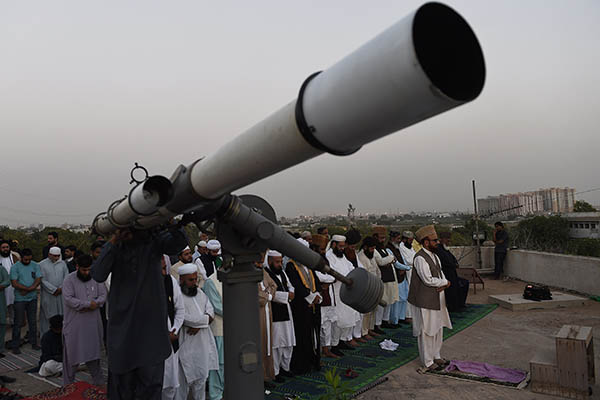
File photo. Asif Hassan—AFP
Science and technology minister’s desire to calculate lunar calendar in advance seen as bridge too far by mullahs
Imran Khan’s government has drawn the ire of conservative mullahs with calls for a science-based lunar calendar to calculate the start of the holy fasting month of Ramzan in Pakistan, which faces an annual controversy over the date.
The beginning of the ninth and holiest month in the Muslim calendar—as well as the Eid holidays and the mourning month of Muharram—is determined by the sighting of the new moon. In Pakistan a cleric-led “moonsighting committee” announces when the fasting should begin, but for decades it has faced disputes over the accuracy of its decision.
“Every year on the occasion of Ramadan, Eid and Muharram a controversy starts regarding moonsighting,” Pakistan’s science and technology minister, Fawad Chaudhry, explained in a video he tweeted on May 5 in which he recounted watching the committee use “old technology”—telescopes—to make their calculations. “When modern means are available and we can determine a final date, the question is why we should not use this latest technology?” he argued.
His ministry will form a new committee of scientists, meteorologists and Pakistan’s space agency to calculate the correct dates for the next five years with “100 percent accuracy.”
However the prime minister’s cabinet can reject the calendar, he added.
In another tweet he warned decisions on how the country should be run “cannot be left to the maulana [clerics].” He added: “The journey ahead has to be undertaken by the youth, not mullahs, and only technology can take the nation forward.”
Mufti Muneeb-ur-Rehman, head of the moonsighting committee, warned that Chaudhry should stay in his lane. “I have appealed to Prime Minister Imran Khan that only the concerned minister should talk about religious matters,” he said in a press conference in Karachi. “Every minister who does not know the sensitivity of the religion, does not understand it, they should not get the free license to comment on religious matters.”
He also pointed out that the committee already has members from the space agency, and also works with the meteorological department.
Over the years the committee’s chief foe has been Maulana Shahabuddin Popalzai, an influential cleric based in Peshawar—the capital of Khyber-Pakhtunkhwa province—who announces the start of Ramzan and Eid a day earlier than the moonsighting committee. The split is considered bad for national unity and social harmony—but years of efforts to reconcile Popalzai with the central committee have been in vain.
Chaudhry’s announcement has ignited an ongoing debate in Pakistan. Many social media users thanked the government for attempting to provide some clarity, but others saw the dark side.
“This decision will further divide the nation,” complained one Twitter user, while another warned that a “gang of ignorant has come to power.”
